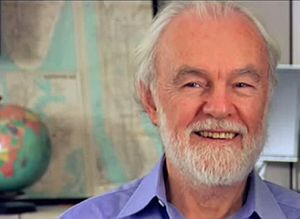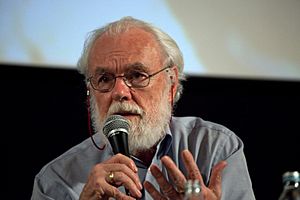David Harvey facts for kids
Quick facts for kids
David Harvey
|
|
|---|---|
 |
|
| Born | 31 October 1935 Gillingham, Kent, England
|
| Alma mater | St John's College, Cambridge |
| Known for | Marxist geography, quantitative revolution in geography, critical geography, economic anthropology, political anthropology, right to the city, time space compression, accumulation by dispossession |
| Scientific career | |
| Fields | Anthropology, geography, political economy, social theory |
| Institutions | CUNY Graduate Center |
| Thesis | Aspects of agricultural and rural change in Kent, 1800–1900 (1961) |
David William Harvey is a famous British-American professor. He was born on October 31, 1935. He is known for studying how cities work and how the economy affects people's lives. He teaches about people and places at a big university in New York City, called the Graduate Center of the City University of New York (CUNY).
David Harvey has written many important books and articles. His work helped shape how we study geography today. He believes everyone should have a "right to the city." This means people should have a say in how their city is planned and used. In 2007, he was one of the most-cited authors in social sciences. This shows how much his work is used by other researchers.
Contents
Early Life and Education
David W. Harvey was born in 1935 in Gillingham, Kent, England. He went to Gillingham Grammar School for Boys. Later, he studied at St John's College, Cambridge, for both his first degree and his advanced studies.
His early studies, including his PhD, looked at how hops (a plant used in beer) were grown in Kent in the 1800s. This was a common way to study history and regions in Britain back then.
Career Highlights
In the mid-1960s, David Harvey started using math and statistics to study geography. This approach was popular in social sciences at the time. His book, Explanation in Geography (1969), was a key text. It explained how to use scientific ideas in geography.
After this book, Harvey changed his focus. He became interested in problems like unfairness in society and how the capitalist system works. He has continued to explore these ideas in his later work.
Studying Cities and Society
David Harvey moved from Bristol University in the UK to Johns Hopkins University in Baltimore, USA. In Baltimore, he saw a lot of unfairness, racism, and exploitation. People were actively working to change these issues. This led him to become a leader in a new field called "radical geography." This field looks at how geography is connected to social and political issues.
In 1972, he wrote an essay about how poor neighborhoods are formed. He suggested that we need "revolutionary theory." This means ideas that are proven through real-world actions to make big changes.
Social Justice and the City (1973)
One of the most important areas affected by radical geography was urban geography. This is the study of cities. David Harvey became a top expert in this field with his book Social Justice and the City (1973).
In this book, Harvey argued that geographers could not just be "objective" (neutral) when facing poverty and other problems in cities. He explained that capitalism, an economic system, changes space to keep itself going.
Later Work and Ideas
David Harvey's later work has been guided by a way of thinking called Dialectical materialism. This approach looks at how things change through conflicts and contradictions. His book Limits to Capital (1982) explored capitalism even further. It looked at how money and finance work and how capitalism can lead to crises.
His book The Condition of Postmodernity (1989) became very popular. It suggested that modern ideas like postmodernism actually come from problems within capitalism itself. This book was named one of the fifty most important non-fiction works published since 1945.
In Justice, Nature and the Geography of Difference (1996), he focused on fairness for people and the environment. His book Spaces of Hope (2000) explored ideas about how a better world might look.
His detailed study of Paris in the 1800s, called Paris, Capital of Modernity, is one of his most important historical works. It looks at the events around the Paris Commune.
After 2001, he wrote The New Imperialism (2003). In this book, he argued that the war in Iraq was a way for some US politicians to distract from problems with capitalism at home. His next book, A Brief History of Neoliberalism (2005), looked at the history of neoliberalism. This is an economic idea that favors free markets and less government involvement. Harvey explained that this system often helps a few people at the expense of many. He called this "accumulation by dispossession." This means taking wealth or resources from people.
His book The Enigma of Capital (2010) looked at the 2008 financial crisis. Harvey explained how capitalism became so powerful and why it led to the crisis. He described capitalism as being without morals or rules. He argued that trying to make capitalism "ethical" is a mistake.
David Harvey returned to Johns Hopkins in 1993. Later, in 2001, he moved to the City University of New York. He has taught many students who have also become important academics. In 2013, he helped Ecuador set up a center for the "Right to the Territory."
Teaching Marx's Capital
Two important parts of David Harvey's life have been teaching a course on Karl Marx's book Capital and supporting student and worker movements. His course on Capital became a popular series of lectures on YouTube. These lectures led to two books that help people understand Marx's ideas.
Recognition and Awards
David Harvey is widely known as a very important scholar in urban geography. His books have been translated into many languages. He has received honorary doctorates (special degrees) from universities around the world.
He has also received many awards. These include the Anders Retzius Gold Medal, the Patron's Medal from the Royal Geographical Society, and the Vautrin Lud International Prize in Geography. He became a fellow of the British Academy in 1998. In 2007, he was chosen to be a member of the American Academy of Arts and Sciences.
Personal Life
David Harvey lives in New York City. He has a daughter named Delfina, who was born in 1990.
Images for kids
See also
 In Spanish: David Harvey para niños
In Spanish: David Harvey para niños
 | Leon Lynch |
 | Milton P. Webster |
 | Ferdinand Smith |



